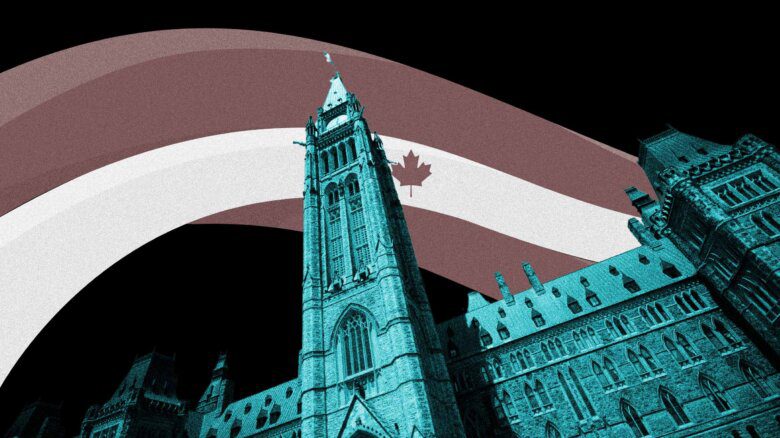Over the last several years, a seemingly familiar movement has popped back up, particularly in the U.S. and Canada. The people behind it brand themselves as campaigning for “parental rights,” and purport to have a simple interest in protecting their children from outside influences. At first blush, it feels like a noble goal—after all, nothing is more sacred in Western civilization than your own family.
But a closer look at the activists behind the movement, along with their specific political demands, reveal that it’s really just another branch of the conservative onslaught against trans lives.
At the forefront of the parental rights debates are how trans kids should be treated in schools and medical offices, and whether or not LGBTQ2S+ lives should be discussed in school. The underlying goal is clear: parents in these movements want full control over what their kids learn, and they want to make sure that queer and trans acceptance never get discussed—the movement is not really about parental rights, but is just a transphobic political campaign in disguise.
The concept of parental rights is not a new one. There are specific parts of law codes that pertain to the rights that parents have, especially with respect to families affected by divorce. But “parental rights” as they’re discussed in movements today, are rarely rights that are actually enshrined in law. Rather, they refer to a concept that has a long history of being used as a buzzword for bigoted and otherwise harmful political goals.
The concept of parental rights was once used to oppose school desegregation and bussing in the ’60s. It’s also been used by anti-vaxers or conservative home-schoolers who oppose the existence of public schools. It’s the central theme of the charter school movement as well.
The current iteration of the parental rights movement in the U.S., the opposition to trans lives, stems largely from Republican Glenn Youngkin’s successful gubernatorial run for Virginia in 2021. His campaign’s central focus was on combatting “critical race theory,” a nebulous term co-opted by the far-right to mean any public content remotely supportive of Black lives, along with building up panic over trans kids following a series of local incidents in schools in the state.
It built quickly from there, funded largely by wealthy far-right political donors who smelled opportunity in the 2022 midterm elections in the U.S. While most of the parental rights candidates failed to make an impact in school board elections, and the issue failed to deliver a large majority in the U.S. House, Florida governor Ron DeSantis found success attacking his Democratic opponent over parental rights. Though largely unsuccessful in gaining sweeping conservative majorities on everything from school boards to the U.S. Senate, the movement has built to the point where transphobia feels like the central animus of the modern conservative movement.
It shouldn’t come as a surprise now that it’s spreading into neighbouring Canada. New policies in Saskatchewan and New Brunswick now bar students from changing their name or pronouns without written permission from the students’ parents. So-called “forced outing” laws like this have become common in conservative states in the U.S., and they threaten trans students with abusive, transphobic parents. Trans kids are disproportionately more likely than their peers to be homeless because of lack of parental acceptance.
This week, thousands of protestors marched across the country to demand so-called “parental rights.” While they were outnumbered by LGBTQ2S+ counter-protestors and their allies in most cities, the cross-country nature of the events is a cause for concern.
Another one of the key planks of the so-called parental rights movement is restricting access to gender-affirming care for trans adolescents. A recent Conservative policy convention vote in Quebec City drew a 69 percent vote in favour of a ban on gender-affirming care for trans minors.
Nonetheless, this proposed policy particularly shows how the “parental rights” movement isn’t really about increasing and supporting the rights of parents.
A ban on gender-affirming care for trans youths would heavily restrict the right of parents to support their trans children with the consensus treatment for gender dysphoria. In the U.S, similar bans have ripped families away from their longtime homes as they flee oppressive conservative states hell-bent on criminalizing them for being loving parents. There is nothing that screams “freedom” or “liberty” over a family who goes back generations in a place like Texas having to uproot and run away to California simply because they were blessed with a trans child.
Other branches of the parental rights movement are pretty straightforwardly bigoted, seeking to segregate trans adults and concepts away from any possible exposure to children. Queer book bans, attacks on drag queen story hours, bans on educational material portraying LGBTQ2S+ identities are all central prongs of this anti-LGBTQ2S+ campaign.
Much of the current anti-trans sentiment comes from a mistaken idea that being trans comes from an “ideology” rather than just the rare but naturally occurring thing it actually is. Transphobic parents operate under the hope that if they just completely deny information that trans people exist, their kid would just naturally turn out cis.
This isn’t how being trans works, though.
When I was a child in the mid-1980s, I had gender dysphoria, but lacked the knowledge to label how I was feeling. Before I knew what a trans woman was, I would cry myself to sleep at night hoping that God would help me wake up the next day as a girl. That’s an early form of gender dysphoria, and it was painful.
Eventually I did learn some words that helped me piece together who I was all along, and was finally able to transition in adulthood. But the pain and cost of my adult transition, in both time and money, was extremely high. Natal puberty is permanent, and many of its effects cannot be reversed by adult gender-affirming care. I had to have my face reworked just so that the people who passed me on the street wouldn’t harass me anymore.
Forcing a trans adolescent through natal puberty is cruel. Forcing a loving family to disaffirm their trans children under penalty of law is a form of ridiculous legal persecution. It’s certainly not “parental rights”; it’s a straightforward legal hammer given to transphobic parents to smash their closeted trans kids with.


 Why you can trust Xtra
Why you can trust Xtra


